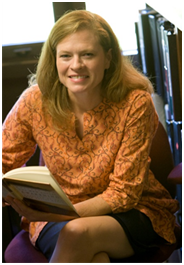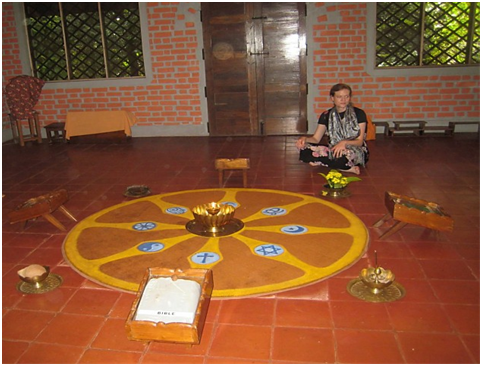Contemplating Radical Love – Elizabeth Hinson-Hasty
 I have been thinking a lot about love in recent weeks and wondering where we see and experience love within and among people today. Personal examples easily come to mind when I think of my partner in life, children, parents, brother, and friends. But, what about expanding the circle to include loving one’s neighbor?
I have been thinking a lot about love in recent weeks and wondering where we see and experience love within and among people today. Personal examples easily come to mind when I think of my partner in life, children, parents, brother, and friends. But, what about expanding the circle to include loving one’s neighbor?
Last week I was haunted by the story of a refugee family whose resettlement in Louisville was placed on hold by the Federal government shutdown. The Katwal family worked for more than a year to rebuild some semblance of life after fleeing Bhutan. With English as their second language, they figured out the process to complete what I imagine was a mountain of paperwork to bring two elderly grandparents to their new home. The grandparents sold their property and headed to the airport prepared to make the long trip to the U.S.A. only to find that they would be stuck waiting. Waiting. Waiting. Surely it must have been maddening. Their story and the stories of so many others whose plans and activities were brought to a grinding halt by the government shutdown continue to cast a shadow on the political players that took center stage.
It is not just the political grandstanding and agenda driven close-mindedness of politicians that haunts me. I am struck by the failure to love and the inability to see how we as individuals are only one small part of a larger, delicate, and intricate web of relationships. Recognizing our essential relatedness gives us a richer picture of ourselves as human beings and enables us to experience a deep sense of love for the whole community.
Consider these rich descriptions of love:
Love is patient, love is kind, it isn’t jealous, it doesn’t brag, it isn’t arrogant, it isn’t rude, it doesn’t seek its own advantage, it isn’t irritable, it doesn’t keep a record of complaints, it isn’t happy with injustice, but it is happy with the truth. Love puts up with all things, trusts in all things, hopes for all things, endures all things.
— 1 Corinthians 13: 4-8
“Your task is not to seek for love, but merely to seek and find all the barriers within yourself that you have built against it.”
– Rumi
“Anger is not the opposite of love … anger signals something amiss in relationship … a critical first step in understanding the power of anger in the work of love.”
– Beverly Wildung Harrison, “The Power of Anger in the Work of Love.”
“Go with your love to the fields.
Lie down in the shade. Rest your head
in her lap. Swear allegiance
to what is nighest your thoughts.
As soon as the generals and the politicos
can predict the motions of your mind,
lose it. Leave it as a sign
to mark the false trail, the way
you didn’t go. Be like the fox
who makes more tracks than necessary,
some in the wrong direction.
Practice resurrection.”
–Wendell Berry, excerpt from “Manifesto: The Mad Farmer Liberation Front.”
 The two part-series of blogs for ecclesio.com created for this week will invite you to contemplate radical love through the experience of others. The first part of the series you will encounter a daughter’s love for a parent who no longer remembers her, a lament written from the perspective of a contemporary woman forced into prostitution, and experience love in the embrace of children in a shelter. The second part of the series will focus on love in the global community.
The two part-series of blogs for ecclesio.com created for this week will invite you to contemplate radical love through the experience of others. The first part of the series you will encounter a daughter’s love for a parent who no longer remembers her, a lament written from the perspective of a contemporary woman forced into prostitution, and experience love in the embrace of children in a shelter. The second part of the series will focus on love in the global community.
Consider some questions as you contemplate the meaning of radical love:
How do we in our market-driven society become fully aware, awake, and open to a sense of love for the whole community?
How do we experience the kind of love that draws us out of the places where we feel most comfortable and secure and into new spaces where transformation, both personal and communal, can occur?
What would it mean to radically expand our own circle of love to include our neighbors?
Respond here to these questions, post meaningful quotations about love, and then return to ecclesio.com later in the week to read and engage other postings about contemplating radical love.
_______________________
Elizabeth Hinson-Hasty is Chair of the Department of Theology at Bellarmine University, Associate Professor of Theology, and co-directs BU’s program in Peace Studies. Her passions in life and research interests include social gospel theology, Christianity and social justice, wealth inequalities, poverty issues, and theologies from the margins. In addition to numerous articles and other publications, she is author of Beyond the Social Maze: Exploring the Theological Ethics of Vida Dutton Scudder (2006) and co-editor of Prayers for the New Social Awakening (2008) with Christian Iosso and To Do Justice: A Guide for Progressive Christians (2008) with Rebecca Todd Peters. She is a Fulbright scholar (Hungary 2010) and a recipient of the Wilson Wyatt Faculty Fellowship for Excellence in Teaching and Scholarship (2010). She makes her home in Louisville with Lee, Garrison, Emme, and Bacsi.


When considering the “how do we…” aspect, my soul says to me that we must first experience a radical love ourselves in order to know what it is we are called to share, not only with those within our comfort zones, but especially those outside … especially those on the fringes and those who don’t feel included. Where have we known such a radical love? Who is it in our memories that so blessed us that we now have it to pass on? For me, it is the unconditional love of God in Jesus Christ transgenerated from my grandmother to my mother, and then to me and my brothers. And, it is the same unconditional love shared with me by my soul-mate and life-partner, Ralph. The “how do we,” then, is to remember it within our souls and then we have all we need to turn to our neighbor and share it just as freely as it was shared with us.
Expanding our own circle of love to our neighbors is a direct injunction from Jesus himself. “Love your neighbor as yourself.” There are many people aching for connection to others, entire families who feel isolated by economic circumstances or illness. We must learn to look with the eyes of God, to see others as God sees them. Radical love is possible only if you have been radically loved, just as Susie Carter Wiggins wrote. The most radical love we can experience is God’s love for us. Passing on radical love is not difficult when something as simple as chatting over a cup of coffee can lift the spirit of one who is alone. Radical love is loving the unlovable, the veteran with Post Traumatic Stress Disorder; the mental health patient who sometimes makes life interesting in your neighborhood; radical love is loving without boundaries. Radical love destroys the boundary of “us” and “them.” When “us” and “them” is eradicated all the world becomes your community. It is our privilege as Christians to give this love even when it is not accepted. The giving is what matters. Loving with all your heart everyone you meet.
I believe Evagrius, 4th century monk and ascetic, said, “We almost never learn to love God before we learn to love our neighbor and we can only love our neighbor after we love ourselves.” It is in my notes but not sure where I found the quote.